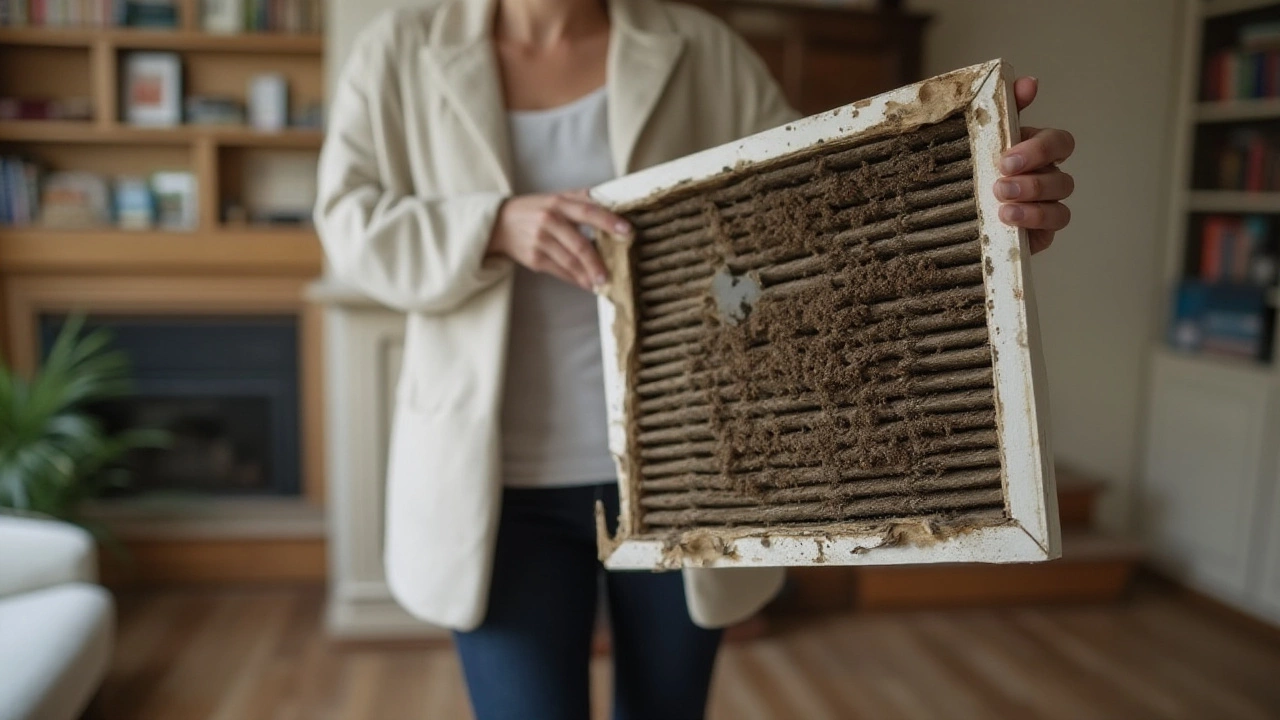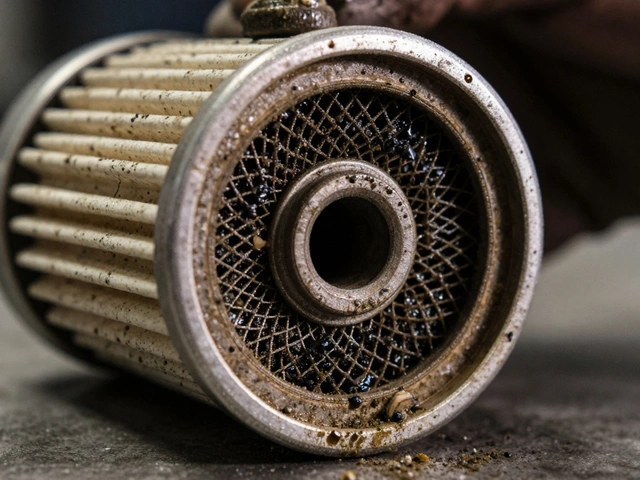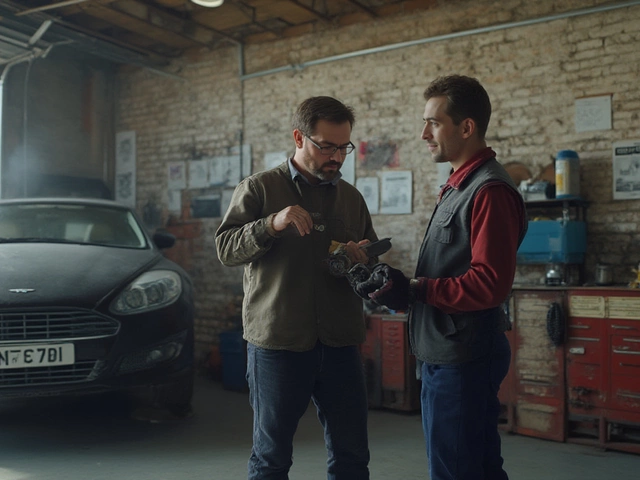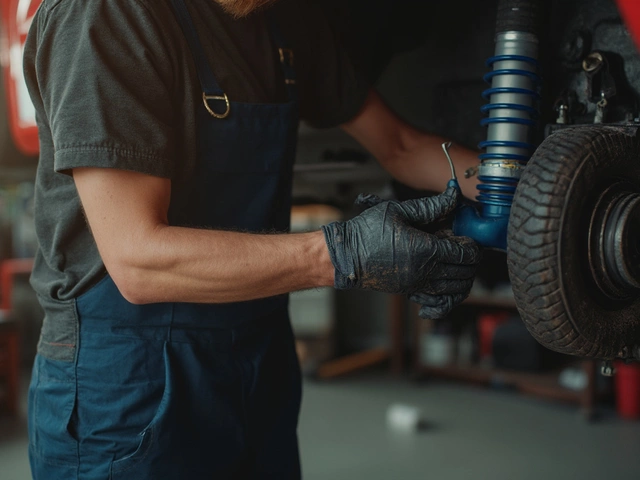Air filters might not be the first thing on your mind, but they play a huge role in keeping your home feeling fresh and your HVAC system running smoothly. The first step to efficient home maintenance is knowing when there's an issue with these crucial components.
If you've been sneezing more than usual or your energy bills seem to be climbing with no explanation, your air filter might be to blame. In this article, we'll walk you through the essential signs and helpful tips to spot a bad air filter and ensure your indoor environment is clean and comfortable.
- Understanding Air Filter Basics
- Telltale Signs of a Bad Air Filter
- How to Check Your Air Filter
- Effects of a Dirty Filter on Your HVAC System
- When and How Often to Replace Air Filters
- Tips for Prolonging Filter Life
Understanding Air Filter Basics
At the heart of every heating, ventilation, and air conditioning (HVAC) system lies the humble air filter, playing a crucial role in maintaining not just the system’s efficiency but also the quality of air you breathe inside your home. An air filter, though small in stature, has the powerful task of trapping dust, pollen, pet dander, and other airborne particles that can pollute your indoor environment. Various types of air filters exist, each with its unique material composition ranging from fiberglass to pleated paper or cloth.
Fiberglass filters are often the most affordable option but may require more frequent replacements due to their limited capacity for capturing smaller particles. On the other hand, pleated filters, with their increased surface area, boast better efficiency at capturing various contaminants, making them a preferred choice for many homeowners. The Minimum Efficiency Reporting Value (MERV) rating system serves as a useful indicator, helping you understand the particulate filtration efficiency of different filters. Filters with a higher MERV rating have a greater ability to trap smaller particles, offering cleaner air.
"In choosing an air filter, it's crucial to consider not just your immediate needs but also your long-term comfort and health," advises David E. MacAller, a respected indoor air quality specialist.
A typical filter should be replaced every 30 to 90 days, although this can vary based on filter type and specific household conditions such as pet ownership or allergy considerations. Frequent usage of heating or cooling systems also implies more frequent changes. Users often find that keeping a log for filter replacement dates can help maintain an effective schedule, ensuring clean indoor air continuously.
Types of Air Filters
When you're choosing the right filter for your HVAC system, it’s essential to understand the different air filter types available. Fiberglass filters are a common choice owing to their affordability. Pleated air filters, however, offer a more robust structure and enhance filtering capabilities with their pleat designs. Electrostatic options, equipped to attract particles through charged fibers, provide high-efficiency filtration that’s beneficial for allergy sufferers. Filter replacement frequency is a critical aspect, influenced by factors like home size, filter size, air quality needs, and HVAC system usage.
Filter Efficiency and Health
Understanding the nuances of filter efficiency can have a meaningful impact not just on your health but also on energy consumption. According to the Environmental Protection Agency (EPA), indoor air can often be more polluted than outdoor air, making it essential to select filters capable of capturing pollutants effectively. Even though high-efficiency filters might present a higher initial cost, their benefits over time through increased energy savings and health improvements often outweigh this.
| Filter Type | MERV Rating | Replacement Frequency |
|---|---|---|
| Fiberglass | 1-4 | 30 days |
| Pleated | 5-13 | 60-90 days |
| Electrostatic | 8-15 | 3-6 months |
Having a deep understanding of air filters isn't only about making sure your HVAC system works well; it's about creating a cleaner, healthier living environment. This means cleaner air to breathe and potentially better health outcomes for you and your family. With a mix of thoughtful selection and regular upkeep, your home will effectively stay its course in filtering out unwanted particles.
Telltale Signs of a Bad Air Filter
The magic of air filters lies in their ability to drastically improve the quality of the air inside our homes, but when they start to fail, the signs can be surprising yet subtle. One of the first clues that your air filter is on the fritz is a noticeable increase in dust around the house. You might find yourself dusting off surfaces more frequently than usual, only to see the dust settle back like an unwelcome guest. This is a clear indication that the filter is no longer able to trap dust efficiently, allowing these particles to circulate back into your living space. Another sign could be your HVAC system working overtime. If you notice it running continuously or having shorter cycles, this could be a response to a clogged filter hindering airflow, causing your system to struggle to maintain the desired temperature.
Have you been feeling a bit under the weather? Increased allergy symptoms are another alarm bell you shouldn't ignore. A bad air filter might not be catching airborne allergens such as pollen, spores, and pet dander. This can result in a stuffy nose, itchy eyes, or even increased asthma symptoms for those sensitive to such irritants. A similar issue could manifest as a musty odor whenever your HVAC system kicks in. This smell can often be linked to a filter that's not just dirty, but potentially harboring mold or mildew, releasing these unpleasant scents into your home.
"An untreated air filter could drop your HVAC efficiency by up to 15%, while leading to higher energy costs," says John Doe, a renowned HVAC expert at the National Energy Conservation Association.
This performance drop isn't just a matter of comfort, but a strain on your wallet too. With an unclean filter, air can't pass through easily, meaning your HVAC system has to work harder, using more energy to push air through to reach the thermostat's set point. This inefficiency results in palpable increases in utility bills, often creeping up gradually until they're undeniable.
Sometimes, strange noises could also point toward a failing air filter. If you hear rattling or a whistling sound coming from vents, it might be worth investigating if the root cause is a filter overdue for a change. A final, yet crucial sign is a difference in airflow. Stand near a vent and feel for the air pressure. Is it weaker than it used to be? This could be the filter restricting the flow, preventing your system from operating efficiently. Regularly checking for these signs can ensure that your air filter doesn't become a hindrance but continues to support a comfortable, healthy living environment.

How to Check Your Air Filter
The process of checking an air filter is simpler than you might think, yet it's an essential task that ensures your HVAC system is working efficiently. Begin by locating your air filter, which can typically be found in the return air duct or just before the blower compartment of your heating or cooling system. Keep in mind that turning off the system before you start is wise, as it enhances safety and prevents dust or debris from inadvertently being drawn into the unit. Simply opening the access panel should reveal the filter, which might be held in place by a simple latch or sliding mechanism.
Once you've exposed the filter, carefully slide it out. A visual inspection alone can tell you a lot; is it loaded with dust and grime? This could mean it's time for a replacement, but we'll delve into that shortly. The mesh of the filter should be visible, rather than obscured by dirt. An especially dirty filter can look almost opaque against the light. If you're still in doubt, compare what you've removed with a new filter at your local store.
Some enthusiasts use a light test—holding up the bad air filter to a bright light to see if any beams pass through. If the rays are significantly blocked, it's a sure indication of a clogged filter. Not only does this affect air quality, but it also taxes your HVAC system, making it work much harder than it needs to. This excessive strain can lead to higher energy bills and unnecessary wear and tear on your unit.
"A clean air filter helps keep your HVAC system running efficiently, saving you money monthly as well as down the line," notes James D. Miller, an HVAC expert with over two decades of experience.
Establishing a routine to check your air filters—at least once every three months—is recommended. However, the replacement frequency can vary based on factors like home size, location, and even pet ownership. Ultimately, clean and checked filters are key players in maintaining energy efficiency and ensuring your home environment remains healthy.
For those who prefer a more technical approach, digital air quality meters can provide additional insights into when an air filter may need changing. These tools measure particulate matter and can offer a clearer picture of indoor air health, supplementing visual and manual checks.
Effects of a Dirty Filter on Your HVAC System
The role of an air filter in your HVAC system is much like that of a liver in your body - it’s all about filtration, trapping particles that can harm the system’s functionality. When the air filter gets clogged with dust, pollen, and various debris, it can't breathe properly, which can have several negative consequences on your HVAC's performance. For starters, you might notice that your system is running more often but not cooling or heating your home as effectively as it once did. This inefficiency results from restricted airflow, causing the system to overcompensate and run for longer periods, eventually leading to a spike in energy consumption and those dreaded high utility bills.
Moreover, keeping a dirty air filter can also cause your system to work harder than it needs to, potentially shortening its lifespan. The buildup of dirt and dust makes it challenging for the HVAC to draw in clean air, leading to wear and tear that can result in expensive repairs or even require you to replace the entire unit. An overworked system is like a marathon runner who hasn't trained properly – it's bound to give out sooner than expected. As the clog worsens, you might notice that certain rooms in your home become hotter or colder than others, another symptom of uneven airflow distribution.
A clogged air filter can also affect the quality of the indoor air you breathe. With reduced air movement, pollutants remain trapped in your home and circulate more freely, potentially exacerbating allergies and respiratory conditions among inhabitants. This often translates to more dust settling on surfaces around your home and might even lead to molds forming within the ducts due to trapped moisture. Additionally, a dirty filter puts the coils and blower fan under immense strain, meaning they could eventually overheat. In situations of overheating, there’s a risk of fire hazards, making regular filter maintenance not just an economic issue, but a safety one as well.
"Neglecting air filter maintenance is like throwing money out the window," says HVAC consultant John Spencer, who has over two decades of experience in the industry. "Not only does it cost more over time, but it also compromises your family’s comfort and safety."
| Potential Harm | Description | Result |
|---|---|---|
| Increased Energy Use | More energy due to longer run times. | Higher electricity bills |
| Reduced HVAC Lifespan | Excessive wear and tear on components. | Costly repairs or replacements |
| Poor Air Quality | Circulation of trapped pollutants. | Health issues like allergies |
By overlooking a filter replacement, homeowners may also notice an unusual increase in dust accumulation around vents and even on furniture. This occurs because some particles manage to bypass the clogged filter and infiltrate the system's ducts. When those particles become airborne, they can land practically anywhere in your living spaces. Regular checks and proper maintenance schedules are mandatory to prevent these issues. So, next time you wonder why your HVAC seems loud or sluggish, it might just be that little filter that needs a change!

When and How Often to Replace Air Filters
Replacing your air filter on a regular basis is essential for maintaining good indoor air quality and ensuring the efficiency of your HVAC system. How frequently you should swap out the filter depends on several factors, including the type of filter you use, the number of people living in your home, pets, and even your local climate. Generally speaking, it's a good rule of thumb to check your filter every month. For common fiberglass filters, replacing them every 30-60 days is usually recommended. More efficient pleated filters can last anywhere from three months to a year, depending on the conditions of your home and the manufacturer's recommendations.
If you live in a particularly dusty area or have pets that shed fur, it's wise to keep a closer eye on your air filter. Pet hair, dander, and dust can clog up a filter faster than you might think, ultimately reducing the lifespan of your filter. Additionally, households with several occupants will typically generate more dust and debris, necessitating a more frequent filter check and replacement routine. During months when your HVAC system is running constantly—like during a scorching summer or a chilly winter—you might find that replacing your air filter monthly becomes more of a necessity to maintain optimal performance.
The U.S. Department of Energy notes that replacing a dirty, clogged filter with a clean one can lower your air conditioner's energy consumption by 5% to 15%. That translates to real savings not only on your monthly energy bill but also by potentially extending the life of your entire system.
To illustrate, consider creating a simple schedule. Begin by setting a reminder each month to inspect your air filter. Jot down how dirty it appears and after a couple of inspections, you'll get a sense of how often it truly needs replacing. If your allergies flare up inside, that's a red flag to check your filter right away. Additionally, keep an eye on your energy bill: if there’s an unexpected increase, your HVAC system might be working harder than it should due to a blocked filter.
Here's a simple replacement guide for various household situations:
- Single occupant with no pets or allergies: Inspect and replace every 6-12 months.
- Family home with no pets: Aim for every 90 days.
- With one pet, such as a cat or dog: Every 60 days.
- Allergies in the household or multiple pets: Every 30 days might be necessary.
Making a habit of checking and changing your air filter can seem like a small task, but it plays a big role in keeping your home environment healthy and your HVAC system running like a well-oiled machine.
Tips for Prolonging Filter Life
Keeping your air filters in great shape is vital for maintaining good air quality and ensuring the efficiency of your HVAC system. One of the simplest ways to extend the life of your air filter is by regular maintenance and awareness of your home's environment. If you frequently engage in activities that cause dust or dander, such as heavy foot traffic or allowing pets inside, you'll need to be more diligent with filter checks. Adjusting these environmental factors can reduce the load on your filters, helping them last longer.
Another practical measure is ensuring that your HVAC system is appropriately balanced. When a system is out of balance, it may work harder than necessary, which can lead to quicker filter degradation. Regular check-ups from a professional can keep your system balanced, and your bad air filter problems at bay. Additionally, consider upgrading to high-efficiency filters if appropriate for your system. They capture more particles, which can mean fewer replacements over time. Always consult your HVAC manual or a professional when choosing an upgraded filter to make sure it fits your system properly.
Humidity and seasonal changes also impact how often you need to change your filters. In humid seasons, the added moisture in the air can cause filters to clog faster, necessitating more frequent replacements. A helpful tip is using a dehumidifier to keep indoor humidity at comfortable levels, which benefits not just your filters, but your overall home environment. Moreover, make a calendar reminder every month to check the filters, spending just a few minutes can save you both money and effort in replacements.
If you're into smart home devices, consider using a smart filter monitor. These gadgets keep track of your filter status and send alerts to your phone when it's time for a change. Many smart thermostats already have this capability built-in, making them a worthwhile investment for tech-savvy homeowners. This allows you to ensure the filter replacement happens precisely when needed. According to a study by the Environmental Protection Agency (EPA), regularly maintained filters can reduce household energy usage by 5-15%, which is a significant saving in the long run.
"Understanding your air filter's schedule and needs is like understanding the rhythm of your home. Regular attention means not just better air quality, but a better quality of life." – John Emerson, HVAC Expert
Lastly, don't ignore the power of simple cleaning. Some filters are washable and can be gently rinsed with water for a longer lifespan. If you're using a disposable filter, consider gently vacuuming it to remove the top layer of debris. This is particularly useful when you've just started noticing the signs of a bad air filter and aren't ready to replace it just yet. This small act of maintenance can help keep your air fresh and your system running efficiently for longer periods.






